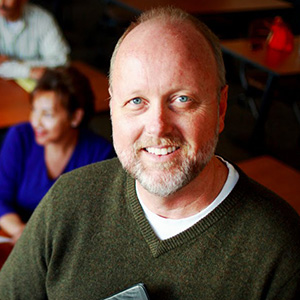
Peter Bolland
Born in West Paterson, New Jersey, Peter Bolland moved to Ventura, California with his family in 1962. At Ventura College he discovered philosophy and transferred to UCSB as a religious studies student. He and his wife moved to San Diego so Bolland could complete a master’s program in philosophy at SDSU. After graduation, he began teaching philosophy at Southwestern College in Chula Vista. For the next ten years, Bolland was an adjunct philosophy instructor at a number of community colleges throughout San Diego, including Palomar College, Miramar College, Cuyamaca College and Southwestern College. Today he is a full-time, tenured professor at Southwestern where he teaches in both the Philosophy and the Humanities department (where he serves as chair).
What do you teach (subjects) and why do you like teaching for Osher?
I teach a wide variety of courses in the areas of philosophy and humanities, and bring that experience to bear on my work at Osher. I love teaching at Osher because the goals there are pure. No one’s going for a degree, or meeting requirements or fearfully compelled to study things that have no deep and personal meaning for them. Everyone in the room in an Osher class is there for one reason – love. They’re there because they believe the work has value, and that something powerful happens when thoughtful people gather together around great questions in a shared inquiry. In Sanskrit it’s known as satsang, a gathering around truth. The dialogues that arise in my sessions at Osher are truly remarkable, and they stay with me for a long time. When one ends, I can hardly wait for the next one to begin.
Can you talk about a few fun anecdotes about why Osher students are wonderful to teach?
Just the other day at the end of my lecture called “The Wisdom of the Buddha” a student approached me and handed me a three-by-five card with a Longfellow quote. “If we knew the secret histories of our enemies, there would be sorrow and suffering enough to dispel all hostilities.” What a pearl of wisdom, and so perfectly aligned with the spirit of the work we had just accomplished, fleshing out the life-changing Buddhist concepts of nonattachment, compassion, and understanding. .
Would you recommend teaching for Osher to others? If yes, why?
I would absolutely recommend teaching at Osher for all of my colleagues in the professor business, and often do. In fact, one of my colleagues at Southwestern College, Alejandro Orozco teaches at Osher now. Teaching at Osher nourishes us in ways traditional teaching does not. Let’s just say this – they cross-pollinate and nourish each other, these two disparate worlds, for-credit classes and life-enhancement classes.
Give me the top reasons why students should take an Osher course
Students should take Osher classes to engage with important ideas, enhance their lives by dialoging in communities filled with life-long learners, stimulate their own creative lives, fuel their passion, and affirm themselves in their long-held suspicion that life is beautiful and made more so when we open our hearts and minds to the gifts others have to share. Osher is what you make of it. Some students take it as an opportunity for quiet, somewhat solitary reflection. Others build wonderful networks of like-minded friends. It fits each of us perfectly because each of us are the authors of our own Osher experience.
What makes Osher classes unique?
Osher classes are special for a number of reasons. The facilities are fantastic. The institutional commitment is apparent. The staff is professional, dedicated, and committed to excellence. And, the instructors are themselves life-long learners who enthusiastically and skillfully draw students into their respective areas of expertise. Everybody wins.
How has teaching Osher students inspired you personally?
I notice that after an Osher session I’m more alert, more focused, and more awake to the wonder of it all. It helps me find my voice. My writing flows more easily, my energy grows and my joy expands. Osher has connected me to an entire community of vibrant, thoughtful, engaged, creative, well-traveled, life-long learners who teach me more than I could ever teach them.
Is there anything you would like to add that I didn’t ask?
As another example of the incredible connections that happen at Osher, it was through Osher that I met Kathi Diamant, Osher instructor and long-time San Diego television broadcaster. We became friends and one day I said to her, “Hey, I want to be on TV.” She said, “I’m shooting something tonight. Come down to the studio and I’ll introduce you to my producer. Maybe we can get you an audition.” Well, I did, and we did, and I guess I passed the audition because now I’m one of their on-air hosts, often alongside Kathi, doing pledge drives and helping KPBS do the vitally important work they do. I love it.
More About Bolland
He is a writer – he has a monthly column in the San Diego Troubadour called “Stages: Philosophy, Art, Culture and Music.” Bolland is also a frequent contributor to Unity magazine. He is an award-winning poet and singer-songwriter, and an on-air host at KPBS television. Bolland also speaks and teaches frequently at a number of other venues like Oasis, and the Unity Center and Vision: A Center for Spiritual Living. His band the Coyote Problem took home two Best Americana Album trophies at the San Diego Music Awards for their two albums “Wire” (2005) and “California” (2007). All of Bolland’s published writing can be found on his blog Thinking Through.